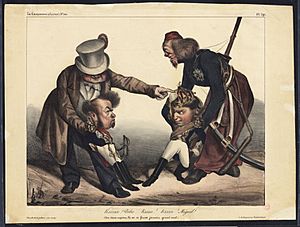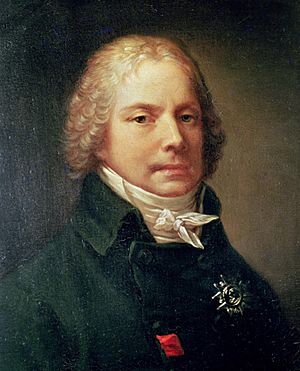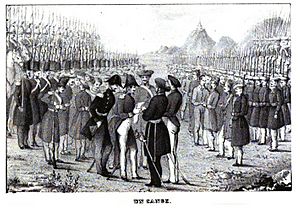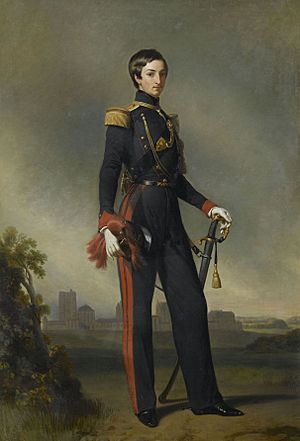1834 Quadruple Alliance facts for kids
The Quadruple Alliance was an important agreement signed by four countries: the United Kingdom, France, Spain, and Portugal. They signed it on April 22, 1834. The main goal was to remove two princes, Miguel of Portugal and Carlos of Spain, from Portugal.
Later, when the Carlist War started in Spain, more agreements were added in August of that year. These new parts said that the other countries would help the official government in Spain. Countries like the Austrian Empire, Russia, and Prussia, which had kings with absolute power, saw this treaty as a way to support liberal governments.
Since France and the United Kingdom were the strongest European powers, they wanted to have some control over Spain and Portugal. These were medium-sized countries with unstable governments, like the one led by Isabella II in Spain. This alliance also meant Spain was no longer part of the Holy Alliance. It was a big deal that France and the United Kingdom, who were often rivals, agreed to work together.
The Quadruple Alliance promised that France and the United Kingdom would support Isabella II. She was the daughter of King Ferdinand VII and the rightful queen. They supported her against her uncle, Carlos María Isidro de Borbón, who wanted the throne. This support was very important for defeating Carlos's followers, known as the Carlists, in the First Carlist War. It also helped make Isabella's government stronger.
Contents
Why the Alliance Was Formed
The revolutions of 1830 changed how European countries worked together. Before this, the Congress of Vienna in 1815 had set up a system. But now, Europe was divided. One side had liberal countries, and the other had countries with absolute rulers.
The Belgian Revolution was the first sign of this split. The United Kingdom and France were on one side. Prussia, Austria, and Russia were on the other.
The United Kingdom and France became closer for many reasons, not just because they shared similar ideas. In France, the 1830 revolution brought Louis-Philippe to power. He supported liberal ideas. In the United Kingdom, the Whigs took control of the government. They passed the Great Reform Act in 1832. This law allowed for more political freedom and more people to vote.
The Whigs and their supporters in Parliament strongly believed in defending liberal ideas across Europe. This shared belief brought France and the United Kingdom together. They formed an Entente Cordiale, which means a friendly understanding. It was a common front against countries with absolute monarchies. However, this partnership had limits. The United Kingdom usually avoided getting involved in other countries' problems. Also, both countries had different economic interests that sometimes clashed.
Meanwhile, Spain and Portugal faced big problems at home. Portugal had been in a war of succession since the mid-1820s. Spain's situation was similar, though its war would start after the treaty was signed. In terms of international politics, Spain was quite alone. Other countries didn't see it as a strong European power anymore. Only France and England first recognized Isabella II as the rightful queen.
What the Alliance Meant
The immediate goal of the treaty was to get Princes Miguel and Carlos out of Portugal. But everyone understood that the agreement meant more than just that. Without saying it directly, England kept its influence in Portugal. It also prevented Spain from acting alone.
The alliance of constitutional countries, known as the "spirit" of the Quadruple, made the Northern Powers (Prussia, Austria, and Russia) nervous. Javier de Burgos called the treaty "a kind of provocation" against these powers.
Negotiating the additional agreements was tricky. It meant turning moral support into real help on the ground. The new agreements mainly involved the United Kingdom and France. France made specific promises but didn't seem to want to fulfill them quickly.
Historians often say that the Quadruple Alliance meant the United Kingdom and France would "look after" Spain and Portugal. This was clear even in the treaty's words. This "looking after" happened because the four countries were not equal in power. Some historians even say it was like an Anglo-French protectorate over the Iberian Peninsula.
Who Signed the Treaty
The idea for the treaty came from the United Kingdom. Portugal joined the treaty with little excitement, even though it needed military help. Portugal saw it as necessary and unavoidable.
Spain, on the other hand, was very enthusiastic about signing. It saw the treaty as a big diplomatic success. It was the "crowning" of Spain's efforts to get closer to the United Kingdom.
At first, Palmerston, the British representative, was hesitant about including France. France was only included because of pressure from Talleyrand, the French ambassador in London. France's role in the final agreement was secondary. It was more about showing that France and Britain were united. This helped to stop rumors from absolute monarchies about disagreements between them. For France, it was a way to strengthen its friendship with Britain. So, France joined not just for problems in Portugal and Spain, but also to get closer to Britain.
What Happened Next
The Quadruple Alliance had two main phases. The first was putting the agreements into action right away. The second was about the "spirit of the Quadruple" after the initial reasons for the treaty were over.
Civil Wars in Portugal and Spain
The first phase successfully solved the problem in Portugal. The Spanish issue and the additional agreements were more complicated. Generally, the British support was more effective, though it was more diplomatic than military or economic.
Historians have different views on military support. Some say it was minimal. Others believe it was more significant. They point to the sending of an Auxiliary Legion, selling weapons, and sending ships to block Carlist supplies. British help was very valuable at times, even with economic costs. For example, it helped end the blockade of Bilbao.
Historians generally agree that France's help in Spain was not very useful, or even negative. France often seemed to help the Carlists more than the Spanish government. Some even say French aid indirectly helped the Carlists the most. French aid often involved sending a small number of volunteers, many of whom ended up joining the Carlist side.
French historians explain this mixed help by saying that Louis-Philippe wanted to avoid a bigger conflict in Europe. He kept talking with Austria, who asked him to "restrain" the United Kingdom. So, France tried to be moderate. Spain even changed its government to a more moderate one, hoping for more French help. But France didn't intervene, which made Spain more dependent on England. Portugal's help in the Carlist war was also slow and not very important.
Besides military aid, the United Kingdom played a key diplomatic role. First, it tried to reduce the cruelty of the war. It helped sign two agreements, the Eliot and Segura Lécera conventions. These had limited success. More importantly, Britain helped with the peace agreements that led to the Convention of Vergara. British diplomats played a big role in these talks, even though their work wasn't always obvious.
The "Spirit" of the Alliance
When the war ended, the treaty officially stopped. But no one wanted to cancel it. This continued influence was called the "spirit" of the Quadruple. It meant that France and Britain had more and more influence in Spain. In fact, they started to compete for this influence. This competition eventually ended the friendship between France and the United Kingdom.
The fight for influence in Spain was mainly about two things. First, economic interests. Second, controlling the Iberian Peninsula was strategically important. It controlled two key routes: the Atlantic to Mediterranean route, controlled by the United Kingdom from Gibraltar, and the French sea route from Marseilles to Algiers. After 1830, this second route was vital for France because of its conquests in Algeria. This made Spain a "key player in Mediterranean politics." Any support in the peninsula quickly became a rivalry. If one country pulled back, the other would try to gain an advantage.
The end of the friendship between France and Britain was also due to their different economic interests. These differences made a strong political union impossible. Internationally, the first disagreements happened in Egypt in 1840. France supported Mehmet Ali in his attempt to break away from the Ottoman Empire. France eventually had to back down.
In Spain, the differences were seen in how each country influenced the government. For example, when Espartero fell from power, it was seen as a time for French influence. In Portugal, the struggles between France and England were less important. Britain's traditional influence there continued.
The turning point for the "spirit" of the Quadruple Alliance happened in Spain. It was about the royal marriages. This caused a final split between France and Britain. It effectively ended the Quadruple Alliance. Both countries tried to prevent the prince who married Isabella II from harming their interests. In the end, the Queen married a Spanish prince to avoid suspicions. But France managed to get the Infanta Luisa Fernanda to marry a Frenchman, the Duke of Montpensier. This broke the balance between the two countries.
The last time the Quadruple Treaty was mentioned was during the Portuguese crisis of 1846-1847. This showed that its "spirit" was gone because France and Britain were no longer friends. Spanish involvement in Portugal worried the English, who feared French influence. This led to a new agreement to solve the Portuguese problem together, using the idea of the Quadruple Treaty. Spain and France thought that working together was the best way to deal with British power.
Historians agree that "after 1847 we can no longer speak of the Quadruple." Also, the revolutions of 1848 changed the international scene. For Spain, it became impossible to have normal relations with a republican France. This opened up new relationships with other powers outside the Quadruple.
How It Affected Spain
The Quadruple Alliance left a deep mark on Spain. Its effects lasted long after 1847. It helped make the Spanish liberal government strong. It also shaped Spain's foreign policy for many years, even until 1939.
This general direction can be summed up in two points. First, Spain became part of a specific system of alliances. It was part of a "Western system" that was different from the absolutist Eastern one. Second, Spain stopped taking sides between France and England. Instead, it took a balanced position. When France and the United Kingdom agreed, Spain would join them. When they disagreed, Spain would stay neutral. The English influence helped strengthen the Spanish liberal government. However, Britain supported the more moderate members of the progressives, not the revolutionaries.
See also
 In Spanish: Cuádruple Alianza (1834) para niños
In Spanish: Cuádruple Alianza (1834) para niños
- Concession of Evoramonte
- The Two Georges, which features a Franco-Spanish dynastic union called the Holy Alliance
 | William Lucy |
 | Charles Hayes |
 | Cleveland Robinson |





